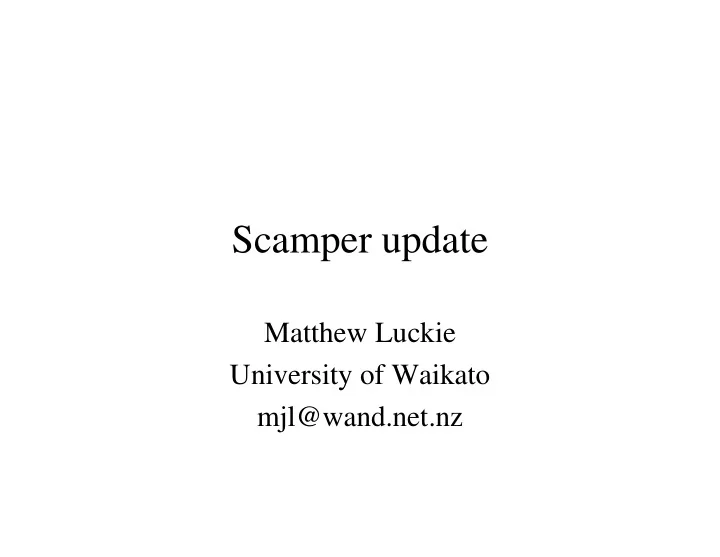

Scamper update Matthew Luckie University of Waikato mjl@wand.net.nz
Recent work on scamper • Enhanced control socket • Numerous enhancements to regular traceroute • Load-balancer traceroute • IP Alias resolution techniques • Firewall support (limited) • Sting • http://www.wand.net.nz/scamper/
Traceroute probe method and forward IP path inference Matthew Luckie Young Hyun Brad Huffaker
Traceroute methods surveyed • UDP – probe id: dport (unused); ephemeral sport; • UDP-Paris – probe id: UDP checksum field; ephemeral sport; unused dport; • ICMP – probe id: icmp sequence field; • ICMP-Paris – probe id: icmp sequence field; • TCP (port 80) – probe id: IP ID; dport 80, ephemeral sport • UDP-Paris DNS – probe id: UDP checksum field; 5-tuple constant; sport 53; unused dport; valid DNS payload
Goals • Determine which traceroute technique is the most effective – most reachable destinations – most complete paths – most IP links discovered – most AS links discovered – fewest gap limits (5 consecutive unresponsive hops) – fewest loops – fewest obviously spoofed responses • … depending on the destination type – 261,530 routable IP addresses selected at random – top 500 webservers as ranked by alexa (422 IPs) – 2000 routers selected at random • will focus mostly on random routable IP addresses
Random routable IP addresses • 257,504 prefixes observed at routeviews for week of 19-25 March 2005 (median snapshot per day) • 255,981 prefixes observed in at least 3 snapshots – one random address per prefix if prefix is more specific than /16 – one per /16 otherwise – never select more than 1 address per /24, addresses in team cymru bogon list, do-not-probe (1.14 /8s) • 261,530 addresses selected • use unique list per vantage point
Methodology • conduct six traceroutes for each destination in random order – UDP * – UDP-Paris – UDP-Paris DNS * – ICMP * – ICMP-Paris – TCP • 5 second cool-down between methods finishing • conduct traceroutes at 100pps from *.ark.caida.org – 11 vantage points – 2 attempts per hop – 5 hop gaplimit – halt on first loop *
261,530 routable IP addresses: cbg-uk reached icmp loop gaplimit unreach udp 5.9% 10.8% 10.0% 73.3% udp-paris 6.1% 11.0% 7.9% 75.1% udp-paris 6.0% 11.1% 7.9% 75.0% dns icmp 9.8% 12.2% 9.2% 68.8% icmp-paris 9.9% 12.4% 8.0% 69.7% tcp (p 80) 9.1% 11.4% 7.8% 71.8%
Comments • ICMP-Paris reaches most destinations – also obtains most ICMP unreachables, which is better than having your probe silently discarded • UDP reaches the least – But it and the ICMP technique are known to produce invalid IP paths more frequently than their Paris counterpart • UDP-Paris DNS performs slightly worse than UDP-Paris
Comments • Reachability results very similar across other ten vantage points – despite different IP lists • Some variation in ICMP-Unreach, Loops, Gaplimit – vantage point a factor
UDP-paris: TCP 15927 23770 915 1066 6407 12073 1873 4224 ICMP-paris cbg-uk: 7795 25965 Total reachable: 34353 (13.1%)
Reachable destinations • Total reachable: 34353 (13.1%) • ICMP-paris by itself yields the most: – 25965 (9.9%) • ICMP-paris and TCP to get: – 33438 (12.8%) • Not using UDP misses 2.7% of destinations reachable with three methods
Complete Paths • Defined as reaching destination and every hop returning an ICMP message – UDP-Paris: 10842 – ICMP-Paris: 17703 – TCP: 15244 – Intersection: 7829
UDP-paris TCP 4852 478 4579 2151 348 621 cbg-uk: ICMP-paris 4709 Total unique complete IP paths: 17738 / 7829
UDP-paris TCP 84605 83733 8325 12490 8097 188143 10914 6850 ICMP-paris 11665 Total unique 84944 adjacent IP hops: 246484
Unique adjacent IP hops • Total 246484 – UDP-Paris 89.2% – ICMP-Paris 88.3% – TCP 87.4% • ICMP-paris and UDP-paris to get 96.7%
UDP-paris TCP 15754 16652 118 513 756 14788 335 595 ICMP-paris 944 Total AS links 16662 inferred: 18049
Summary so far • ICMP-paris reaches most destinations, infers most AS links – TCP not far behind • UDP-paris infers most IP links – TCP least • TCP and ICMP IP paths appear to be the most similar – vantage point has an effect, but trend is there • Firewalls are most commonly two TTLs from the target.
Inferring Spoofed Destinations #1 • ICMP destination unreachable: port unreachable – RFC 792: Indicated port is not running an active process – Source address may vary, but supposed to be from destination – Used in alias resolution
Inferring Spoofed Destinations #1 Spoofed UDP-Paris: TTL TTL PU TCP / ICMP-Paris: TTL TTL TTL TTL not dst, not loop Of 13335 port unreachables for UDP-Paris, 44 were spoofed
Inferring Spoofed Destinations #2 A B C D E A B E Spoofed Of 23770 destinations reached with TCP, 212 were spoofed. 162 SYN/ACK 43 RST/ACK
Packet counts • ICMP-Paris: 6,183,075 • TCP: 6,266,375 • UDP-Paris: 6,362,914 (3% more than ICMP)
Router list • 2000 IP addresses selected at random • Previously observed in traceroute path: – to send time exceeded message – at least one additional ICMP time exceeded past the address, from a different IP
2000 random routers reached icmp loop gaplimit unreach udp 69.2% 5.8% 1.7% 23.3% udp-paris 70.0% 5.8% 0.8% 23.4% udp-paris 68.2% 6.0% 0.8% 25.1% DNS icmp 84.5% 5.9% 1.4% 8.2% icmp-paris 85.1% 5.8% 0.8% 8.3% tcp (p 80) 67.1% 6.7% 0.7% 25.6%
Webserver list • Screen scrape of alexa.com top 500 • Resolved from san-us.ark.caida.org • 422 IP addresses selected – 58 Google ccTLD instances => 4 – Ebay ccTLD instances – Akamai
422 webservers reached icmp loop gaplimit unreach udp 43.0% 4.3% 3.3% 49.4% udp-paris 43.0% 3.5% 2.4% 51.1% udp-paris 46.3% 2.6% 2.4% 48.7% DNS icmp 76.4% 2.4% 2.6% 18.7% icmp-paris 76.6% 1.9% 2.1% 19.4% tcp (p 80) 95.5% nil 2.1% 2.4%
Conclusion • ICMP-Paris is superior in destinations reached, AS links • UDP-Paris finds more intra-AS IP links • Using multiple probe methods improves coverage – Also allows integrity of IP paths to be tested • UDP-Paris DNS bit of a flop
Recommend
More recommend